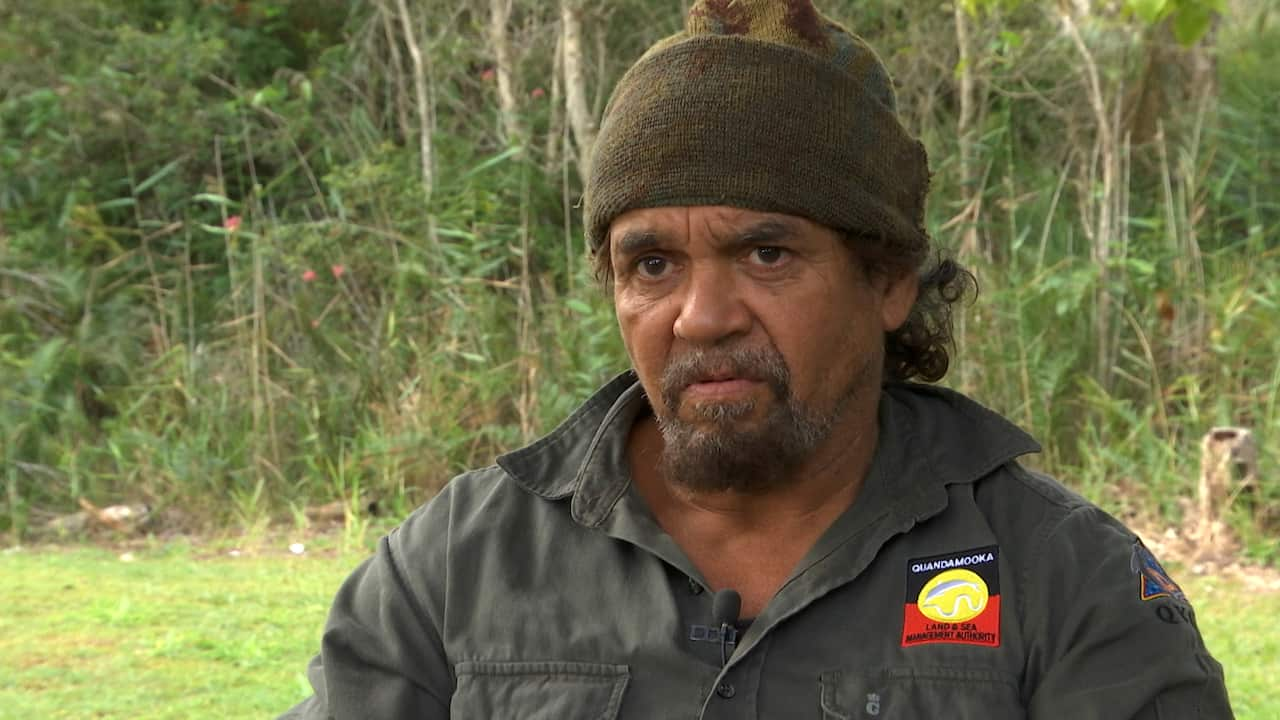If he did not have his job as a park ranger, Jacob Martin thinks he would be in jail.
He was expelled from high school at 14 and subsequently wasted time on Queensland’s North Stradbroke Island hanging around a bad crowd, drinking excessively and spending time "in and out of watch houses".
As a way to keep occupied, Mr Martin started joining his older brothers and cousins who were working as rangers at One Mile Creek. The small Aboriginal community, populated by the Quandamooka people, is made up of about 150 residents who live in makeshift homes.
"I just kept showing up every day, just looking for something to do with all the older cousins, and they were doing a good thing to keep our clean water for all our old people out at One Mile," Mr Martin told NITV News.
He was eventually offered a ranger traineeship, studied conservation and land management, and was promoted to a coordinating position.
"It was a bonus, you know. I was learning how to get a job, manage the country all in one just after leaving school," the 24-year-old Quandamooka man said.
"I think if I never had this job, or if it hadn’t continued on for so many years, I really don’t think I’d be walking the streets, I think I’d be in and out of jail. And [I wouldn't] have the life I have to look after my young family."
One of the island’s four female rangers, Claudia-Rose Engelbrecht-Walker, said the work is culturally rewarding.
"We grew up in the bush, so I suppose it’s just like being at home when I’m at work. I’m in my comfort zone," the 24-year-old Quandamooka woman said.
"I think it’s good to encourage our people to take care of the land, because they need to know about their land and learn about their culture and save it, keep it good for their kids and their kids’ kids."
Carrying on a 20,000-year legacy
The island, 43km off the coast of from Brisbane, is known as Minjerribah to its Traditional Owners. There are 25 Indigenous rangers working there. Most have grown up on North Stradbroke Island and are under 25 years old.
"These young ones have embraced it, and they believe in it, and they invest in it, and as an Elder... it makes you immensely happy," said Darren Burns, coordinator for Quandamooka Land and Sea Management Agency.
"The whole lot of them are encouraged to believe – believe in themselves, believe in what they’re doing, believe in their future, because they believe in their connection to country, they’re so strong in that, so all this other belief system for them – it’s right there."

The Quandamooka people have occupied the island for at least 20,000 years.
Traditional land management practices were disturbed after colonisation but Mr Burns said winning native title in 2011 put the Quandamooka people "back in the driver's seat".
The decision has led to more autonomy and ongoing funding for ranger programs – offering a career path for some of the island’s young people.
One of the other results from the Aboriginal community gaining control of the land has been rangers using traditional burn management practices.
"It’s very rewarding work,” Mr Burns said.
“It’s spiritual enrichment for us, and particularly for the young ones, because they’re seeing that landscape come back to life from just being an obscure dense bushland, take that excess fuel out and you’re immediately looking at a landscape, a cultural landscape that was set up by the old people, so that’s amazing to do that."
For Mr Burns, promoting Aboriginal land management is key for reconciliation and healing.
"It’s at the core of our being," he said.
"Aboriginal people have a need within themselves to care for their land, it’s an instinct.
"I think by denying Aboriginal people that opportunity, it’s ongoing genocide. That whole conversation – colonisation, sovereignty, genocide - that conversation has got a long way to go, but it’s being addressed to a large degree by community ranger programs and native title.
"It’s food for the soul and all of that... healthy land, healthy people – that’s a no-brainer."
Meanwhile, Mr Martin hopes ranger programs like this will continue to thrive across Australia – for the sake of country, culture and community.
"Before we got native title and had these type of jobs, there wasn’t a lot of support," he says.
"All the young fellas that’d leave school, or weren’t going to school, they had nothing but time to get in trouble... So I think it’s a really important thing to keep these programs going, to employ our younger people and keep them out of trouble, keep them occupied, give them a job, so they can provide for their families and put food on the table."
Watch The Point live on Thursday evenings, 8.30pm on NITV (Ch. 34) or catch up at SBS On Demand. Join the conversation on Twitter, #ThePoint.
Follow Ella Archibald-Binge on Twitter.
Delve into the latest Indigenous news and features from NITV's agenda-setting program, The Point. Read more about NITV
Have a story or comment? Contact Us


